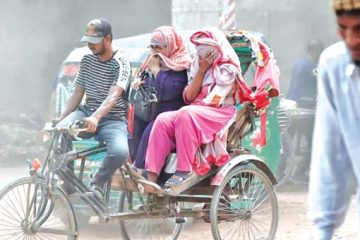Rohan Samarajiva
 I was surprised, during my last stay in Dhaka, to read a magazine article about Bangladesh’s “population problem” that made no reference to demographic structure. Modern scholarship no longer sees population solely as a burden, understanding that the relevant question is not about the size of the population as such, but about its demographic structure, the way the population is distributed across different age groups.
I was surprised, during my last stay in Dhaka, to read a magazine article about Bangladesh’s “population problem” that made no reference to demographic structure. Modern scholarship no longer sees population solely as a burden, understanding that the relevant question is not about the size of the population as such, but about its demographic structure, the way the population is distributed across different age groups.
When the demographic structure is such that there is a “boom”, or an unusually large generation in the economically-active age group, with low dependency on the economically active group by their elders and by their children, the potential for realisation of a demographic dividend in the form of rapid economic growth is high.
Retrospective analysis of growth of the East Asian “tiger” economies and even the post-war economic boom in the US has shown a strong contribution from this demographic factor.
When the age structure is such that an unusually large cohort among the elderly has to be supported by a relatively smaller number in the economically active age group, there is a demographic danger. The economically active cohorts will not be able to grow the economy because of the burden of supporting the elderly in the absence of effective social welfare systems. In sum, countries should get rich before becoming old.
Starting in around 2013, Bangladesh will enter the best period for realising the demographic dividend, with the lowest levels of combined child and adult dependency in its history. This golden period will last until around 2033 when the more burdensome adult dependency (ratio of adults over 65 years of age to the working population aged 15-65 years) reaches significant proportions.
One can, of course, define the demographic-dividend period broadly or narrowly, using, say 60 percent combined dependency as the marker in the former or 50 percent combined dependency in the latter.
The broad definition will yield a longer period starting now and extending to around 2046; the narrow definition will yield a very short period from 2015 to 2023.
It is noteworthy that 2021, the fiftieth anniversary of the founding of the state of Bangladesh and the target year of the national vision of becoming a middle-income country, falls squarely within the span of each of these periods.
If the golden years are not used to achieve economic growth and build a good social security system, Bangladesh will face the demographic danger, or the demographic time bomb. With large numbers of the elderly to look after with little help from government, the shrinking working population will become less productive and entrepreneurial.
The country will become mired in a low-growth stasis. In these conditions, out migration will increase, shrinking further the working population and making it even more burdened and less productive. The country will now be in a downward spiral.
Therefore, one should not look at the low-total-dependency period simply as an opportunity to grow the economy. It is like the seven years of plenty that come before the seven years of famine. The seven good years are there to prepare for the famine. Those who do not use the opportunity will starve.
USING THE GOLDEN YEARS WELL
The demographic dividend is not automatic. When conditions such as good educational preparation, relatively good infrastructure facilities and law and order exist, the entrepreneurial energy of individuals within the relatively less burdened working population is likely to be unleashed. The productive energy of the larger workforce and their greater spending power will yield higher baseline economic growth.
According to demographic-dividend theorists, “having a larger, healthier and better-educated workforce will only bear economic fruit if the extra workers can find jobs”. If jobs are not available, a country may even see riots and rebellion from the boom generation.
Most of our countries release the pressure by encouraging labour migration or giving make-work employment in the state sector. The latter is counter-productive, misallocating resources that should be used for providing training and building infrastructure. The former solution of encouraging expatriate employment is sub-optimal because of the stresses placed on family life and the loss of multiplier effects of domestic employment.
It is here that information and communication technologies can make a difference. In the past, only agricultural and manufacturing goods could be exported. Now, thanks to telecom, even services can be exported. Bangladesh is currently said to have 30,000 persons working in the Business Process Outsourcing (BPO) industry.
In 2005-06, it was estimated that India created 1.3 million direct jobs in the IT and IT enabled services sector, with another 3 million jobs created indirectly, to serve the industry. The proportionate numbers for Bangladesh, which has one-seventh the Indian population will be 182,000 direct jobs and 421,000 indirect jobs.
Agriculture and manufacturing can create new and better-paying employment and exports by integrating ICTs into value chains: for example, by ensuring traceability in the case of agriculture and improved logistics and customisation in the case of manufacturing. Creating exports and high-quality, well-paying employment in agriculture, manufacturing and services by the integration of ICTs is essential to realisation of the demographic dividend.
For all this, Bangladesh needs telecom policy and regulation that seek to realise value in industries that use telecom as an input, rather that extract the maximum rent from telecom itself.
Shonar Bangla: not automatic; not on a platter; but a potential that can be realised by the government and the private sector working to remove the barriers to entrepreneurship and job creation, in particular through better policy and regulation for the ICT sector; then by concerted action to build a social security safety net to face the challenges of the subsequent demographic danger.
Rohan Samarajiva is the chair and CEO of LIRNEasia, a regional ICT policy and regulation think tank. He served as policy advisor to the post and telecommunications ministry of Bangladesh until 2009. He can be reached at rohan@lirneasia.net.







